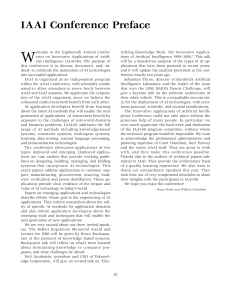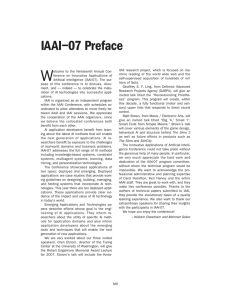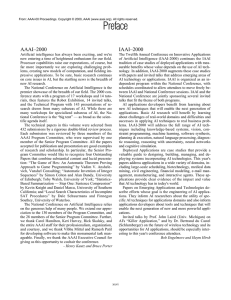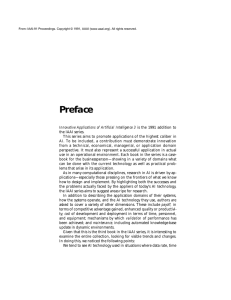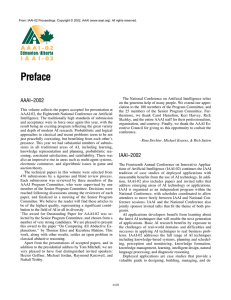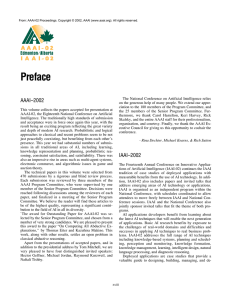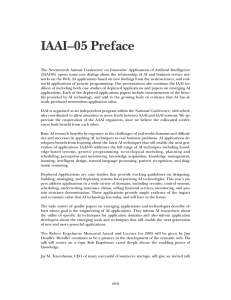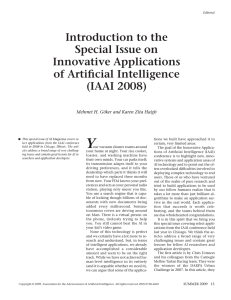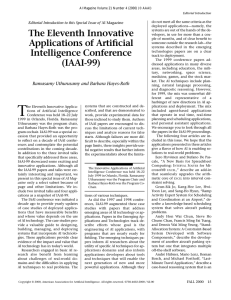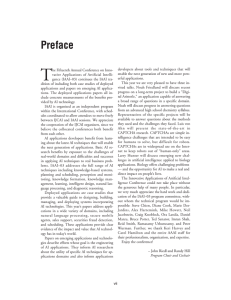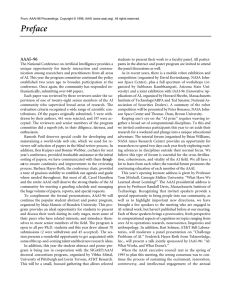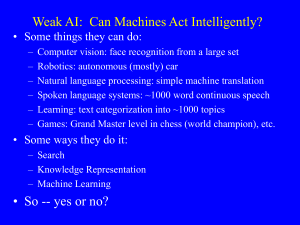Preface AAAI–99
advertisement
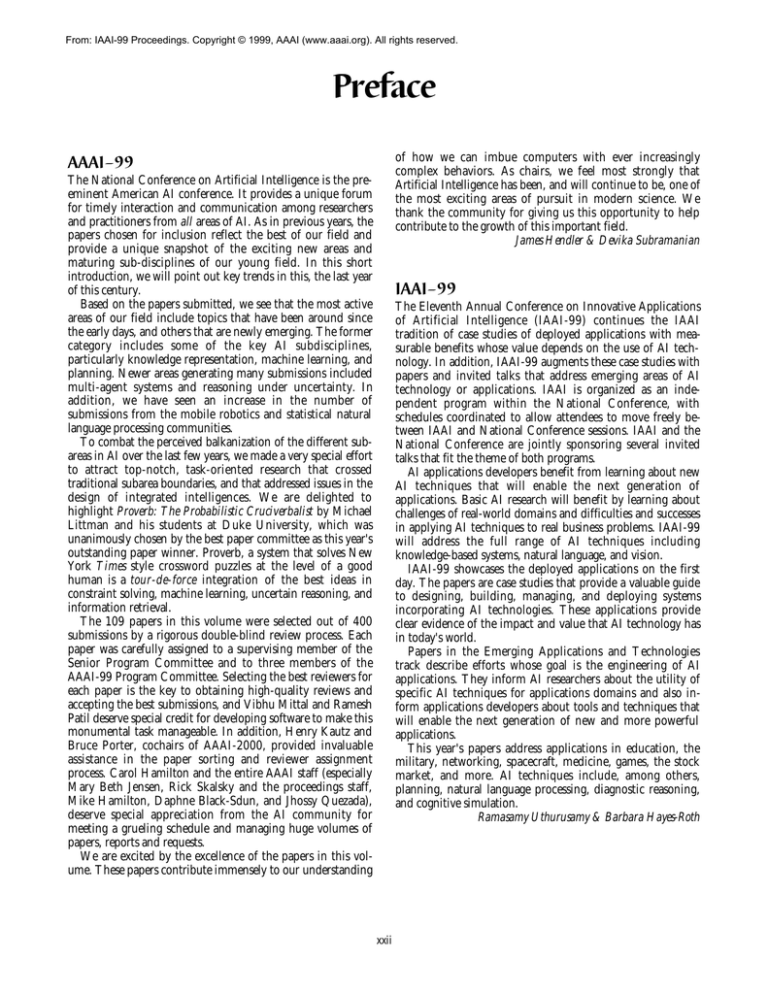
From: IAAI-99 Proceedings. Copyright © 1999, AAAI (www.aaai.org). All rights reserved. Preface of how we can imbue computers with ever increasingly complex behaviors. As chairs, we feel most strongly that Artificial Intelligence has been, and will continue to be, one of the most exciting areas of pursuit in modern science. We thank the community for giving us this opportunity to help contribute to the growth of this important field. James Hendler & Devika Subramanian AAAI–99 The National Conference on Artificial Intelligence is the preeminent American AI conference. It provides a unique forum for timely interaction and communication among researchers and practitioners from all areas of AI. As in previous years, the papers chosen for inclusion reflect the best of our field and provide a unique snapshot of the exciting new areas and maturing sub-disciplines of our young field. In this short introduction, we will point out key trends in this, the last year of this century. Based on the papers submitted, we see that the most active areas of our field include topics that have been around since the early days, and others that are newly emerging. The former category includes some of the key AI subdisciplines, particularly knowledge representation, machine learning, and planning. Newer areas generating many submissions included multi-agent systems and reasoning under uncertainty. In addition, we have seen an increase in the number of submissions from the mobile robotics and statistical natural language processing communities. To combat the perceived balkanization of the different subareas in AI over the last few years, we made a very special effort to attract top-notch, task-oriented research that crossed traditional subarea boundaries, and that addressed issues in the design of integrated intelligences. We are delighted to highlight Proverb: The Probabilistic Cruciverbalist by Michael Littman and his students at Duke University, which was unanimously chosen by the best paper committee as this year's outstanding paper winner. Proverb, a system that solves New York Times style crossword puzzles at the level of a good human is a tour-de-force integration of the best ideas in constraint solving, machine learning, uncertain reasoning, and information retrieval. The 109 papers in this volume were selected out of 400 submissions by a rigorous double-blind review process. Each paper was carefully assigned to a supervising member of the Senior Program Committee and to three members of the AAAI-99 Program Committee. Selecting the best reviewers for each paper is the key to obtaining high-quality reviews and accepting the best submissions, and Vibhu Mittal and Ramesh Patil deserve special credit for developing software to make this monumental task manageable. In addition, Henry Kautz and Bruce Porter, cochairs of AAAI-2000, provided invaluable assistance in the paper sorting and reviewer assignment process. Carol Hamilton and the entire AAAI staff (especially Mary Beth Jensen, Rick Skalsky and the proceedings staff, Mike Hamilton, Daphne Black-Sdun, and Jhossy Quezada), deserve special appreciation from the AI community for meeting a grueling schedule and managing huge volumes of papers, reports and requests. We are excited by the excellence of the papers in this volume. These papers contribute immensely to our understanding IAAI–99 The Eleventh Annual Conference on Innovative Applications of Artificial Intelligence (IAAI-99) continues the IAAI tradition of case studies of deployed applications with measurable benefits whose value depends on the use of AI technology. In addition, IAAI-99 augments these case studies with papers and invited talks that address emerging areas of AI technology or applications. IAAI is organized as an independent program within the National Conference, with schedules coordinated to allow attendees to move freely between IAAI and National Conference sessions. IAAI and the National Conference are jointly sponsoring several invited talks that fit the theme of both programs. AI applications developers benefit from learning about new AI techniques that will enable the next generation of applications. Basic AI research will benefit by learning about challenges of real-world domains and difficulties and successes in applying AI techniques to real business problems. IAAI-99 will address the full range of AI techniques including knowledge-based systems, natural language, and vision. IAAI-99 showcases the deployed applications on the first day. The papers are case studies that provide a valuable guide to designing, building, managing, and deploying systems incorporating AI technologies. These applications provide clear evidence of the impact and value that AI technology has in today's world. Papers in the Emerging Applications and Technologies track describe efforts whose goal is the engineering of AI applications. They inform AI researchers about the utility of specific AI techniques for applications domains and also inform applications developers about tools and techniques that will enable the next generation of new and more powerful applications. This year's papers address applications in education, the military, networking, spacecraft, medicine, games, the stock market, and more. AI techniques include, among others, planning, natural language processing, diagnostic reasoning, and cognitive simulation. Ramasamy Uthurusamy & Barbara Hayes-Roth xxii
